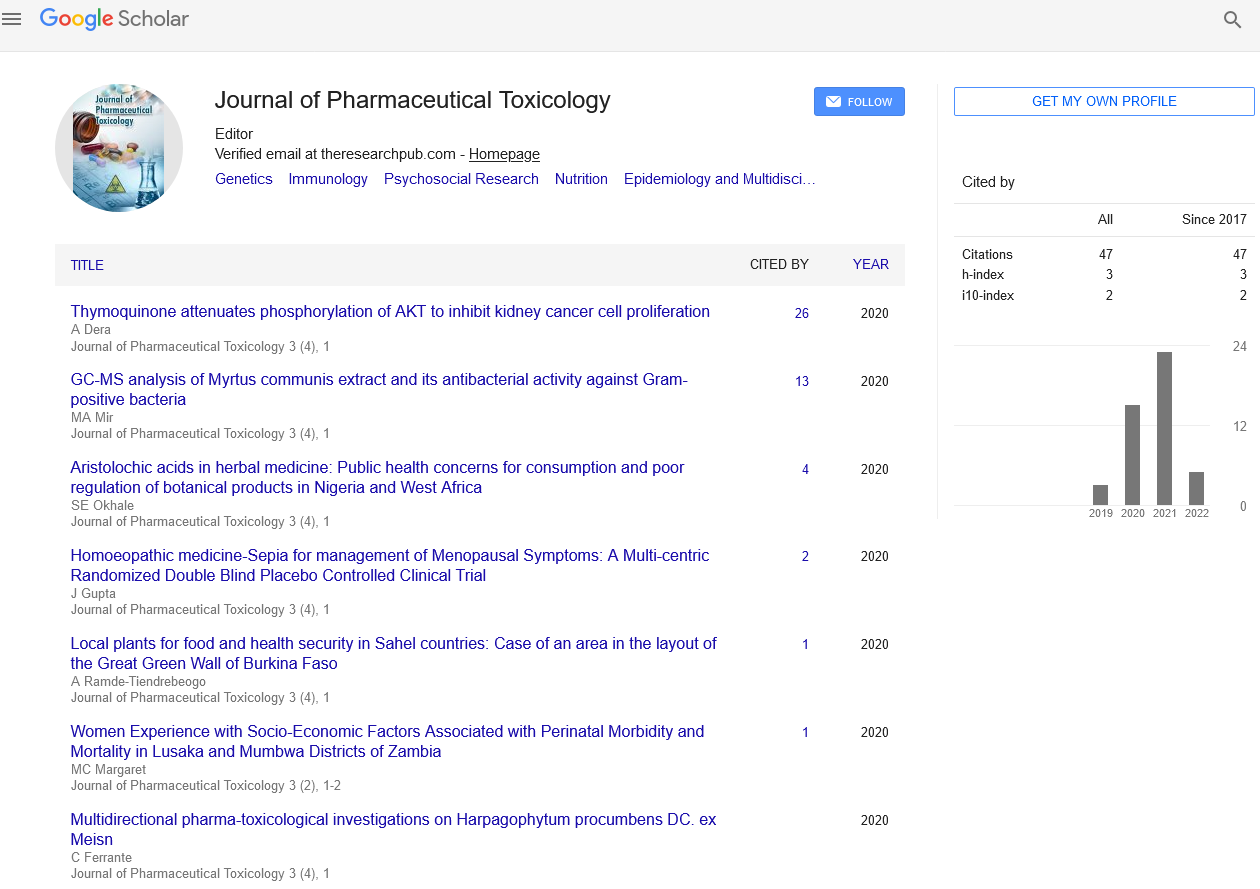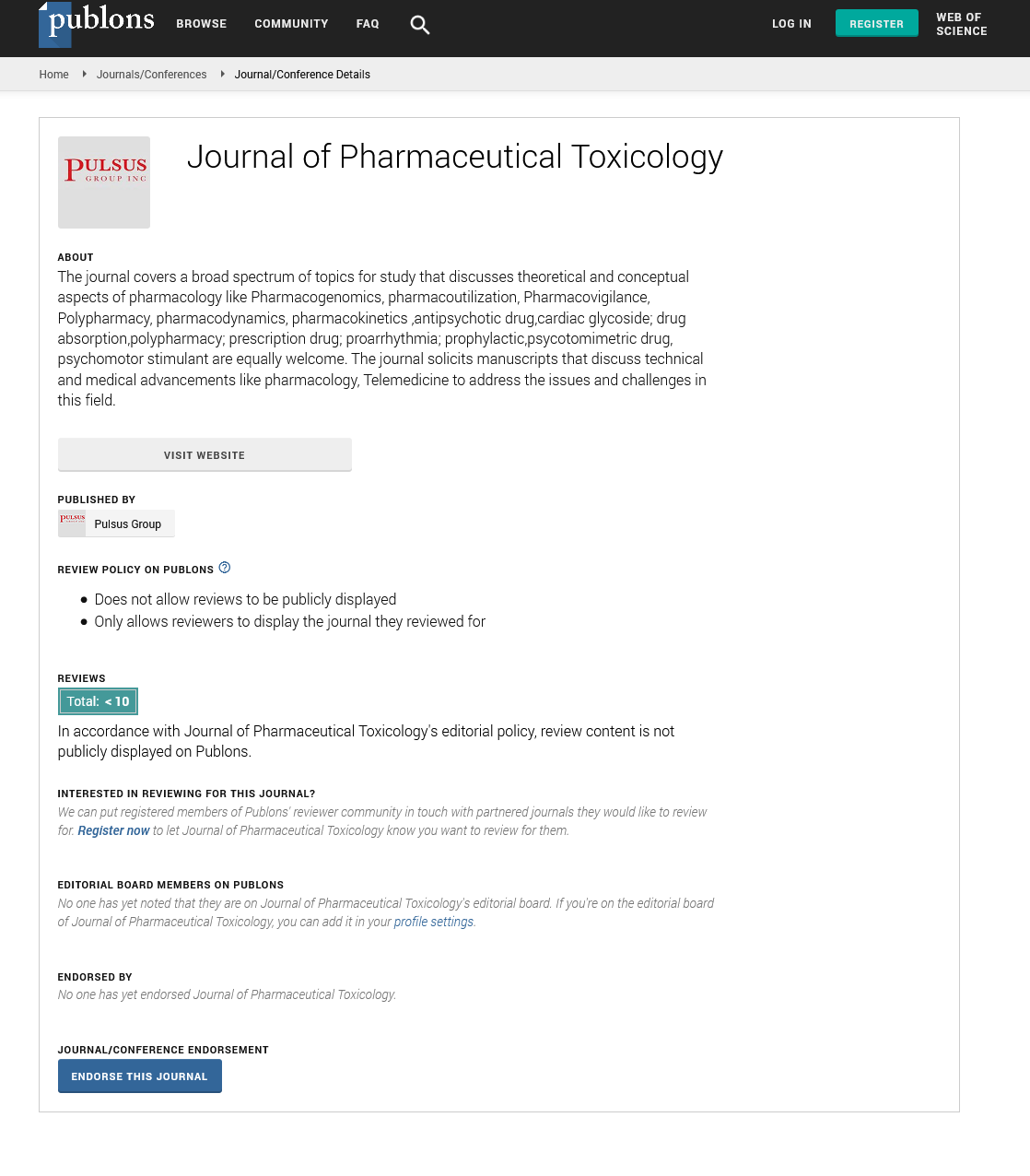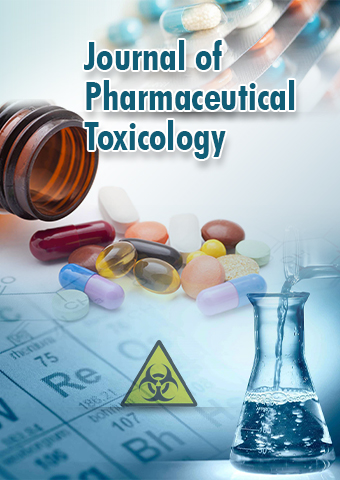Mini Review - Journal of Pharmaceutical Toxicology (2023) Volume 6, Issue 2
Understanding Toxicology: The Science of Poisons and Their Effects
Bingo Retold*
Department of Pharmaceutical Sciences, North Dakota State University, USA
Department of Pharmaceutical Sciences, North Dakota State University, USA
E-mail: Bin_guo@2gmail.com
Received: 03-April-2023, Manuscript No. jpt-23-96219; Editor assigned: 06-April-2023, PreQC No. jpt-23- 96219 (PQ); Reviewed: 20-April-2023, QC No. jpt-23-96219; Revised: 21-April-2023, Manuscript No. jpt-23- 96219 (R); Published: 28-April-2023 DOI: 10.37532/jpt.2023.6(2).48-50
Abstract
Toxicology is the scientific study of poisons and their effects on living organisms. It encompasses a broad range of topics, from the effects of drugs and chemicals on human health to the impact of environmental toxins on wildlife populations. The field of toxicology is crucial in understanding how toxic substances affect the body and how exposure to these substances can be prevented. The science of toxicology has been around for centuries. In ancient times, people were aware of the toxic properties of certain plants and animals and used this knowledge to create poisons for hunting and warfare. In modern times, toxicology has evolved into a sophisticated science that relies on advanced analytical techniques and a deep understanding of the mechanisms by which toxic substances affect the body.
Keywords
Toxicology • Environmental hazards • Drug administration
Introduction
Toxicologists study the ways in which toxic substances interact with living organisms. This includes understanding how the substance is absorbed, distributed, metabolized, and eliminated by the body. They also study the molecular and cellular mechanisms by which these substances cause toxicity, including how they disrupt normal physiological processes and cause damage to cells and tissues. One of the primary goals of toxicology is to determine safe levels of exposure to toxic substances. This is done by conducting experiments in which animals or cell cultures are exposed to various doses of the substance and the effects on the organism are observed. These experiments are designed to identify the dose at which toxicity occurs and to establish a threshold below which exposure is considered safe [1].
Toxicology has many practical applications. It is used in the development and testing of new drugs and chemicals, as well as in the assessment of environmental hazards. Toxicologists also play a crucial role in public health, helping to identify and manage outbreaks of toxicological emergencies such as poisoning from contaminated food or water. In recent years, toxicology has become increasingly important in the field of environmental science. This is due in part to the growing awareness of the impact that environmental toxins can have on human health and the environment. Toxicologists are involved in the assessment of environmental hazards such as air and water pollution, and they work to develop strategies for mitigating the risks associated with exposure to these substances [2,3].
Discussion
In conclusion, toxicology is a vital science that plays a critical role in our understanding of the effects of toxic substances on living organisms. The field has evolved significantly over the centuries and continues to be an essential tool in the development of new drugs and chemicals, as well as in the assessment of environmental hazards. By continuing to study and understand the mechanisms by which toxic substances affect the body, toxicologists can help to protect human health and the environment from the harmful effects of exposure to these substances. Toxicology is the scientific study of poisons and their effects on living organisms. It encompasses the study of harmful chemicals, drugs, and other substances that can cause harm to humans, animals, and the environment. Toxicologists are scientists who specialize in studying the effects of toxins and poisons and develop strategies for preventing, treating, and managing their effects.
Toxicology has many applications in various fields, including medicine, pharmacology, environmental science, and public health. Toxicologists work in laboratories, universities, hospitals, government agencies, and private industries to identify and evaluate the toxicity of chemicals, drugs, and other substances. The study of toxicology involves understanding the mechanisms of toxicity, the dose-response relationships, and the factors that influence toxicity. Toxicity can be influenced by a variety of factors, including the chemical properties of the substance, the route of exposure, the duration of exposure, and the sensitivity of the exposed organism [4,5].
There are many types of toxicants, including environmental toxins, occupational toxins, and drugs. Environmental toxins can be found in the air, water, and soil, and include pollutants like lead, mercury, and pesticides. Occupational toxins are found in the workplace and include substances like asbestos, benzene, and carbon monoxide. Drugs, both prescription and illicit, can also have toxic effects on the body. Toxicology research has led to the development of many important regulations and policies designed to protect public health and the environment. For example, the U.S. Environmental Protection Agency (EPA) regulates the use and disposal of hazardous materials, while the U.S. Food and Drug Administration (FDA) regulate the safety and efficacy of drugs and medical devices.
Toxicology is also used to develop new treatments for poisoning and to improve our understanding of the effects of toxins on the body. Research in toxicology has led to the development of new antidotes and therapies for poisoning, as well as new methods for detecting and measuring toxicants in the body. Overall, toxicology plays a crucial role in protecting public health and the environment by identifying and mitigating the harmful effects of toxicants. As new chemicals and substances are introduced into the environment, toxicology will continue to play a vital role in evaluating their potential toxicity and developing strategies for minimizing their impact on human health and the environment. Toxicology is the scientific study of the adverse effects of chemical, physical, or biological agents on living organisms. Environmental toxins refer to chemicals that are released into the environment and can be harmful to humans, animals, and plants. These toxins can come from various sources, such as industrial waste, pesticides, and air pollution. In this article, we will discuss the impact of environmental toxins on human health [6,7].
Air pollution is one of the most significant environmental toxins that can affect human health. Exposure to air pollution can cause a range of health problems, from mild irritation to severe respiratory illnesses. Fine particulate matter, which is a type of air pollutant, can penetrate deep into the lungs and cause inflammation, respiratory infections, and lung cancer. Air pollution can also aggravate existing medical conditions such as asthma, chronic obstructive pulmonary disease (COPD), and cardiovascular disease. Pesticides are chemicals used to kill pests that damage crops, livestock, and human health. Exposure to pesticides can cause a range of health problems, including skin irritation, nausea, headaches, and respiratory problems. Long-term exposure to pesticides has been linked to an increased risk of cancer, Parkinson’s disease, and reproductive disorders.
X Heavy metals such as lead, mercury, and cadmium are toxic to humans even in small quantities. Exposure to these metals can cause a range of health problems, including damage to the nervous system, kidney damage, and an increased risk of cancer. Lead exposure is particularly harmful to children, as it can cause developmental problems and learning difficulties. Endocrine disruptors are chemicals that can interfere with the body’s hormonal system. These chemicals can mimic the body’s natural hormones or block the effects of hormones, leading to a range of health problems. Exposure to endocrine disruptors has been linked to reproductive problems, developmental disorders, and an increased risk of certain cancers [8].
Environmental toxins can have a significant impact on human health. While we cannot eliminate exposure to environmental toxins entirely, there are steps we can take to reduce our exposure. These steps include choosing organic produce, avoiding the use of pesticides in our homes and gardens, and reducing our exposure to air pollution by using public transportation or walking instead of driving. By taking these steps, we can protect our health and the health of the planet. Toxicology is the study of the effects of chemical, physical, and biological agents on living organisms. It is an essential field of study in today’s world, as we are constantly exposed to a wide range of potentially harmful substances in our environment, food, and even in the products we use.
Toxicology plays a crucial role in identifying and assessing the risks associated with exposure to these substances. Through toxicological research and testing, scientists can determine the level of toxicity of a substance and establish safe exposure limits for humans and other organisms. Toxicology also plays a critical role in the development and regulation of drugs, pesticides, and other chemicals. Before a new drug or chemical can be released to the market, it must undergo rigorous toxicological testing to ensure its safety [9,10].
Conclusion
In recent years, there has been growing concern about the potential health effects of exposure to chemicals such as bisphenol A (BPA), phthalates, and perfluorinated compounds (PFCs), which are commonly found in plastics, food packaging, and other consumer products. Through toxicological studies, scientists have been able to demonstrate the harmful effects of these substances and advocate for their regulation or removal from products.
Toxicology also plays a critical role in environmental protection. Through studies of the effects of pollutants on ecosystems, toxicologists can identify the sources of contamination and develop strategies to reduce or eliminate them. In conclusion, toxicology is a critical field of study in today’s world. It helps us understand the potential risks associated with exposure to various substances and supports the development of safe products and practices. As we continue to face new environmental and health challenges, toxicology will play an increasingly important role in protecting the health and well-being of people and the planet.
Conflict of Interest
None
Acknowledgement
None
References
- Abt MC, Artis D. The intestinal microbiota in health and disease the influence of microbial products on immune cell homeostasis. Curr Opin Gastroenterol. 25, 496-502 (2009).
- Schaffert CS, Duryee MJ, Hunter CD et al. Alcohol metabolites and lipopolysaccharide roles in the development and/or progression of alcoholic liver disease. World J Gastroenterol. 15, 1209-1218 (2009).
- Wiest R, Rath HC. Bacterial translocation in the gut. Best Pract Res Clin Gastroenterol. 17, 397-425 (2003).
- Garcia-Tsao G, Lee FAY, Barden GE et al. Bacterial translocation to mesenteric lymph nodes is increased in cirrhotic rats with ascites. Gastroenterology. 108, 1835-1841 (1995).
- Such J, Francés R, Muoz C et al. Detection and identification of bacterial DNA in patients with cirrhosis and culture-negative, nonneutrocytic ascites. Hepatology. 36, 135-141 (2002).
- Shindo K, Machida M, Miyakawa K et al. A syndrome of cirrhosis, achlorhydria, small intestinal bacterial overgrowth, and fat malabsorption. Am J Gastroenterol Suppl. 88: 2084-2091 (1993).
- Liu MT, Rothstein JD, Gershon MD et al. Glutamatergic enteric neurons. J Neurosci Res. 17, 4764-4784 (1997).
- Shehadi WH. The biliary system through the ages. Int Surg J. 64, 63-78 (1979).
- Stroffolini T, Sagnelli E, Mele A et al. HCV infection is a risk factor for gallstone disease in liver cirrhosis an Italian epidemiological survey. J Viral Hepat. 14, 618-623 (2007).
- Bouchier IA. Postmortem study of the frequency of gallstones in patients with cirrhosis of the liver. Gut. 10, 705-710.
Google Scholar, Crossref, Indexed at
Google Scholar, Crossref, Indexed at
Google Scholar, Crossref, Indexed at
Google Scholar, Crossref, Indexed at
Google Scholar, Crossref, Indexed at
Google Scholar, Crossref, Indexed at
Google Scholar, Crossref, Indexed at


